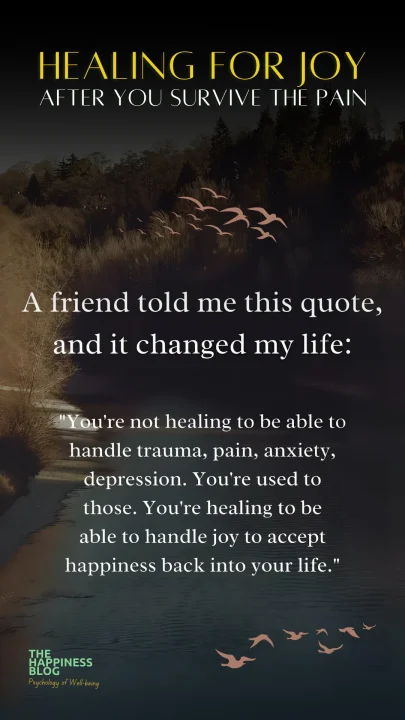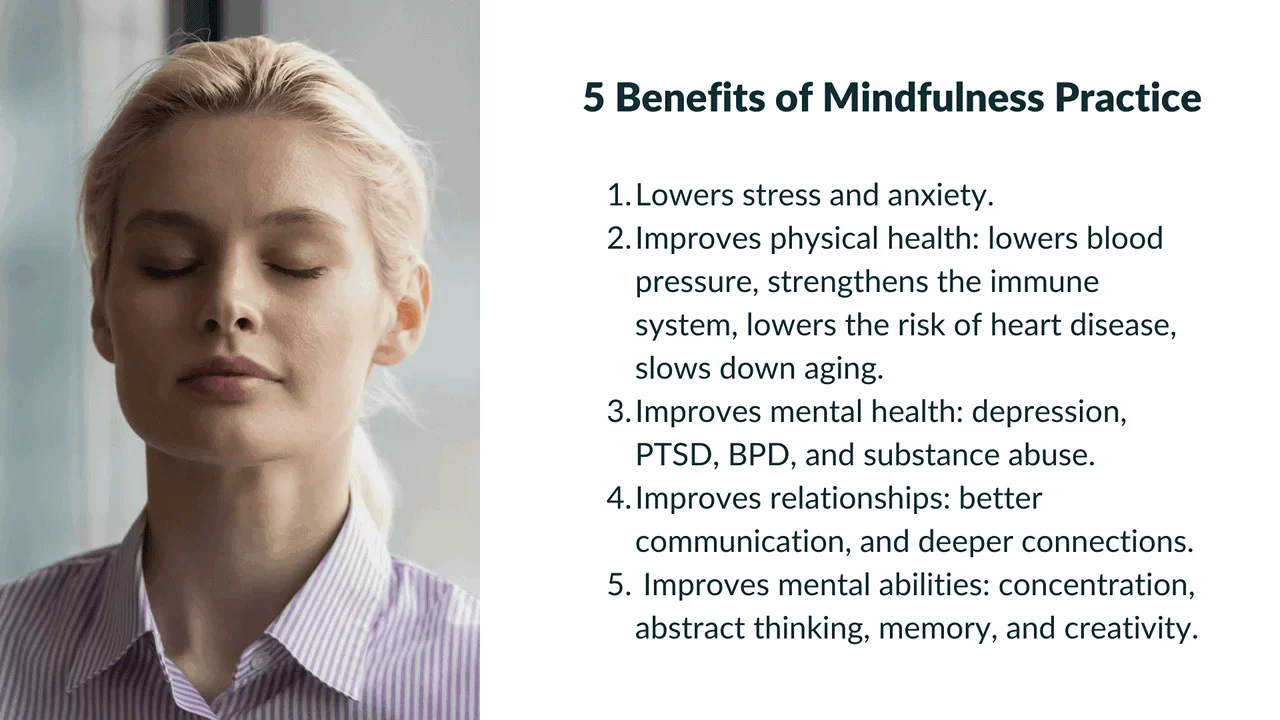Today's Thursday • 6 mins read
You survived the pain and started your healing journey. But now joy feels unsafe. Why is it difficult for you to let happiness in while you are healing?
- Many people start their healing journey to move away from the pain of anxiety, grief, and abuse.
- While others seek healing to move towards personal growth and a more fulfilling life.
Both ways, healing becomes a new challenge when life starts offering peace again. When you see the first strands of happiness, hope, and connection.
That’s when something unexpected happens. You pull back.
You know you’re not your broken earlier self. And that after you heal the darkness, you have to let the light in. Still, you’re not ready to embrace the good yet.
So, what does it take to truly make space for happiness after you survived the hard part?
1. Joy Feels Like A Stranger
Pain can feel oddly safe because it’s familiar. You know how to brace for it, after having done that for years.
But joy feels unpredictable. Your nervous system may treat it as a threat simply because it’s unfamiliar. By instinct, our minds push away anything we don’t understand because we are unsure of its effects on us.
That’s why some people feel restless or suspicious when life becomes calm. Your body might associate stillness with danger, especially if chaos was your baseline.

- People recovering from trauma may not be able to welcome joy and love with open arms because of learned helplessness. People in this state feel like they have no control over their lives, no matter how much they try. This makes it hard for them to be happy, even when good things are happening.
- They may fear joy, a condition called cherophobia. These people are anxious or uneasy when they are happy or when they are expecting to be happy. This is usually because they think that the good times will soon end and be replaced by bad times.
Healing isn’t just about escaping pain. It’s about re-learning how to trust something good when it arrives.
Over time, stability can become the new familiar. But for now, you have to give it gentle awareness and patience.
- Take the Happiness Measures Quiz to figure out how happy you are in your life now.
2. The Brain Learns Survival First
“We do not become enlightened by imagining figures of light, but by making the darkness conscious.” — Carl Jung
When your brain gets wired by trauma, it prioritizes protection, not pleasure.
Even when danger is gone, your system keeps scanning for it. That’s why a peaceful moment might trigger a sudden sense of unease. Healing helps you teach your brain that joy isn’t a trap.
Neuroscience shows this clearly. The amygdala, which helps detect threats, becomes overactive in chronic trauma.
Meanwhile, the brain’s reward system (mainly the prefrontal cortex and dopamine pathways) may under-function. Healing slowly restores this balance.
3. Guilt And Joy Often Show Up Together
You might feel guilty for being okay when others aren’t. Or feel like you don’t deserve happiness after what you’ve been through.
That’s not your fault. It’s a leftover echo from times when survival meant suppressing your needs. Guilt isn’t proof you’re doing something wrong. It’s just an old emotional reflex.
This is especially common in those who were taught to prioritize others’ comfort over their own.
Letting go of guilt doesn’t mean you stop caring. It means you start including yourself in the circle of compassion.
- These are the 7 Things To Let Go Of For More Peace In Life.
4. Happiness Requires Presence
Pain often pulls you into the past. Healing pulls you into the present.
And the present moment is where optimal happiness happens. It’s called mindfulness: paying attention in the present moment, purposefully and non-judgmentally.
To feel happiness, you have to notice it as it is happening. That takes slowing down.
It means paying attention to the small joys. Like lingering on a kind word to yourself, feeling good after a good night’s sleep, letting your shoulders relax every once in a while.
Even brief daily moments of mindful awareness, like noticing your breath, sensations, and environment, can help you regulate your emotions better, feel happier, and be more resilient during stress.
Mindfulness-based studies confirm its benefits.

5. You Need Practice, Not Perfection
Happiness won’t feel natural at first. That’s okay.
Your capacity for joy builds over time. Just like muscle memory, it strengthens with practice.
Let yourself smile without overthinking it. Let yourself rest without guilt. Let yourself be loved without explaining why you’re hard to love.
Start small. Gratitude journaling, joyful music, and making meaningful social connections are some proven ways to train your brain to notice safety in your immediate environment.
Learn to savor joyful and peaceful moments. They will help you get your emotions back in balance towards the positive.
6. Feeling Good Can Be The Hardest Part
Struggling is exhausting. But thriving? That’s vulnerable.
Because now you have something to lose. Healing means choosing to care anyway. It means opening the door, even when you’re afraid.
Joy asks for openness, and openness means risk. But avoidance doesn’t keep you safe, it keeps you stuck.
You don’t have to be fearless to feel good. Just willing. Let happiness feel unfamiliar at first.
That’s how you know you’re entering new emotional territory. You’re not just healing away from pain.
You’re healing toward joy.
7. Post-Traumatic Growth Is Real
Healing isn’t just about recovery. Sometimes, it leads to growth, a deeper appreciation of life, stronger relationships, clearer values.
In fact, the idea that great good can come from great suffering is ancient. Modern researchers call this post-traumatic growth (PTG).
Psychologists found many people report more meaningful lives after trauma, once they’ve processed it. The shift doesn’t erase the pain, but it often transforms your relationship with it.
“Posttraumatic growth is the experience of positive change that occurs as a result of the struggle with highly challenging life crises. It is manifested in a variety of ways, including an increased appreciation for life in general, more meaningful interpersonal relationships, an increased sense of personal strength, changed priorities, and a richer existential and spiritual life.” — Tedeschi & Lawrence, 2009
You might come out more emotionally open. More grounded. Less tolerant of what drains you. These are not side effects. They’re signs of forward healing.
Final Words
Don’t wait for other people to make you happy; instead, push yourself to have new, positive experiences.
Note what Kennon Sheldon, professor of psychological science at the University of Missouri, says,
“We can stay in the upper half of our ‘set range’ of potential happiness as long as we keep having positive experiences, and avoid wanting too much more than we have.”
√ Also Read: What To Do When No One Understands You?
√ Please share it with someone if you found this helpful.
» You deserve happiness! Choosing therapy could be your best decision.
...
• Disclosure: Buying via our links earns us a small commission.